Restroom trailers offer numerous eco-friendly benefits that cater to environmentally conscious event planners. Their efficient water usage is one of the key advantages, utilizing advanced, low-flow flush systems that significantly reduce water waste compared to traditional portable toilets. These systems are designed to minimize environmental impact while maintaining optimal user comfort and sanitation standards. Additionally, many restroom trailers are constructed using recycled materials, further enhancing their environmental credentials. The integration of renewable energy sources such as solar panels adds to their sustainability, providing power for lighting and ventilation without relying on fossil fuels. This innovation not only reduces the carbon footprint of events but also promotes the use of clean energy solutions. Restroom trailers are designed with waste management in mind, incorporating efficient waste disposal systems that ensure hygienic and environmentally responsible handling of waste. The separation of greywater and blackwater allows for more effective treatment, reducing the potential for environmental contamination. Moreover, some trailer providers offer eco-friendly cleaning solutions, utilizing biodegradable and non-toxic products that are gentle on the environment while maintaining high levels of cleanliness. By choosing these options, clients can support green initiatives and reduce the environmental impact of their events. Restroom trailers often include features that enhance user experience and promote environmental awareness, such as motion-activated lighting and plumbing fixtures that reduce electricity and water consumption. These features not only elevate the level of convenience and comfort for users but also align with sustainability goals, making restroom trailers an attractive choice for eco-conscious event organizers. Finally, the adaptability and quality of design enable restroom trailers to be used repeatedly across multiple events, reducing waste and the need for single-use portable facilities. This reusability ensures that each unit has a longer lifecycle, decreasing the demand for new manufacturing and conserving resources in the production process.
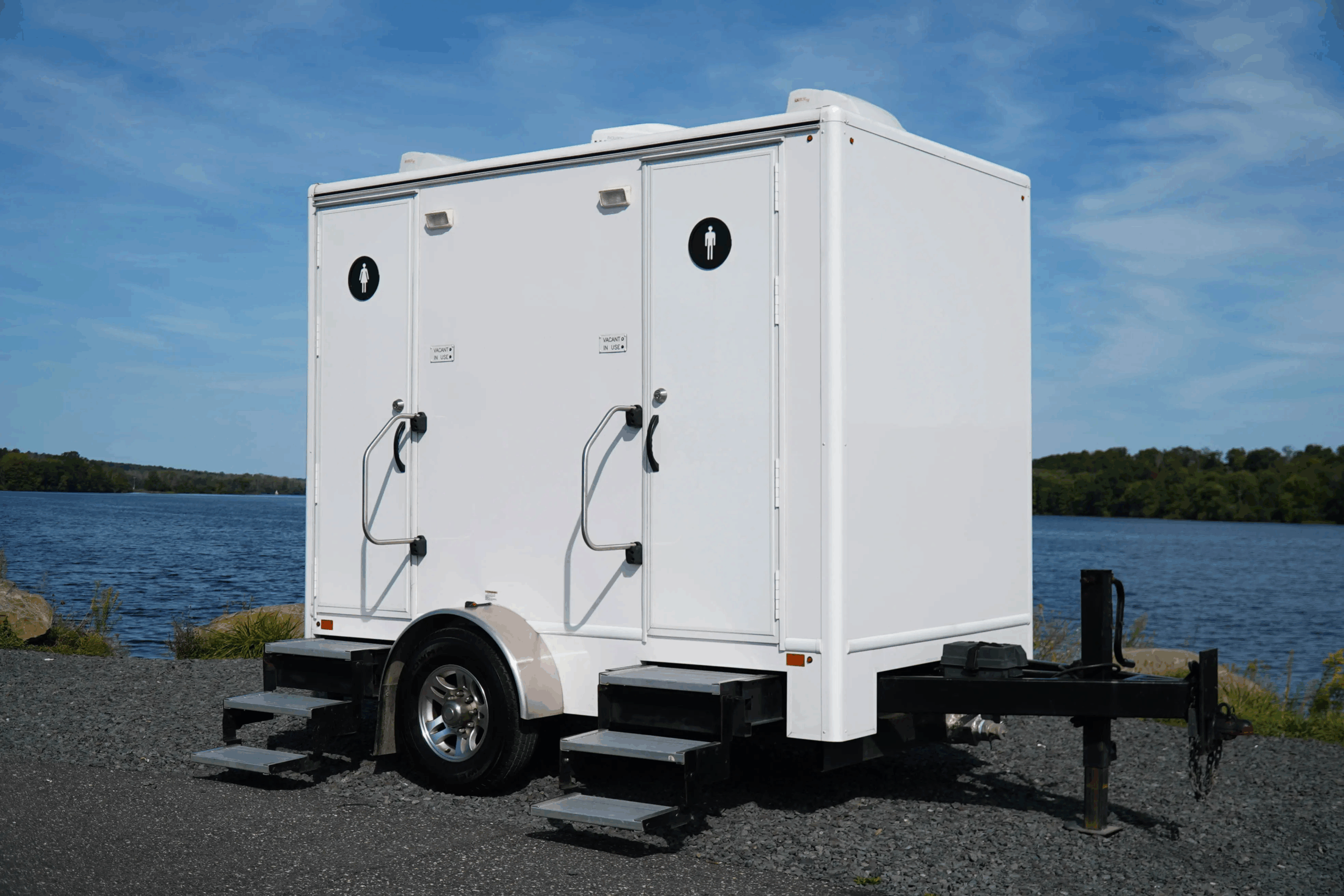
Restroom Trailer Rentals in Wyoming County, Virginia
Call today for a free quote (276) 277-9235
Restroom Trailer
Fast, Easy, & 100% Free To Get Started
Over 20 Years Experience
For more than 20 years, R&R Enterprises has delivered exceptional service in Wyoming County, building a strong bond with the community. Our local expertise and commitment guarantee reliable, trustworthy services crafted to address your every restroom trailer need with precision and care.
Unmatched Quality Service
We deliver top-tier service thanks to meticulous attention to detail and a strong commitment to customer satisfaction. Our Restroom Trailers are meticulously cleaned and maintained to the highest standards, providing all our clients with a smooth and seamless experience.
Fast and Reliable Delivery
We promise quick delivery of our restroom trailers to ensure your event runs smoothly without any hassles. Our efficient team prioritizes timeliness, ensuring that your units are in place and ready to use exactly when you need them.
Comfortable Restroom Trailer Solutions in Wyoming County
Call for a Free Quote Today
(276) 277-9235
Experience top-notch service with our locally owned and operated restroom trailer services in Wyoming County, Virginia. We are dedicated to providing dependable and reliable solutions for any event. Whether you're organizing a construction site, party, festival, or wedding, our restroom trailers deliver the utmost convenience and comfort. Our experienced team ensures each unit meets high-quality standards for sanitation and cleanliness, offering peace of mind for your guests or workers. We proudly serve not only Wyoming County but also nearby areas, always striving to meet the community's growing needs.
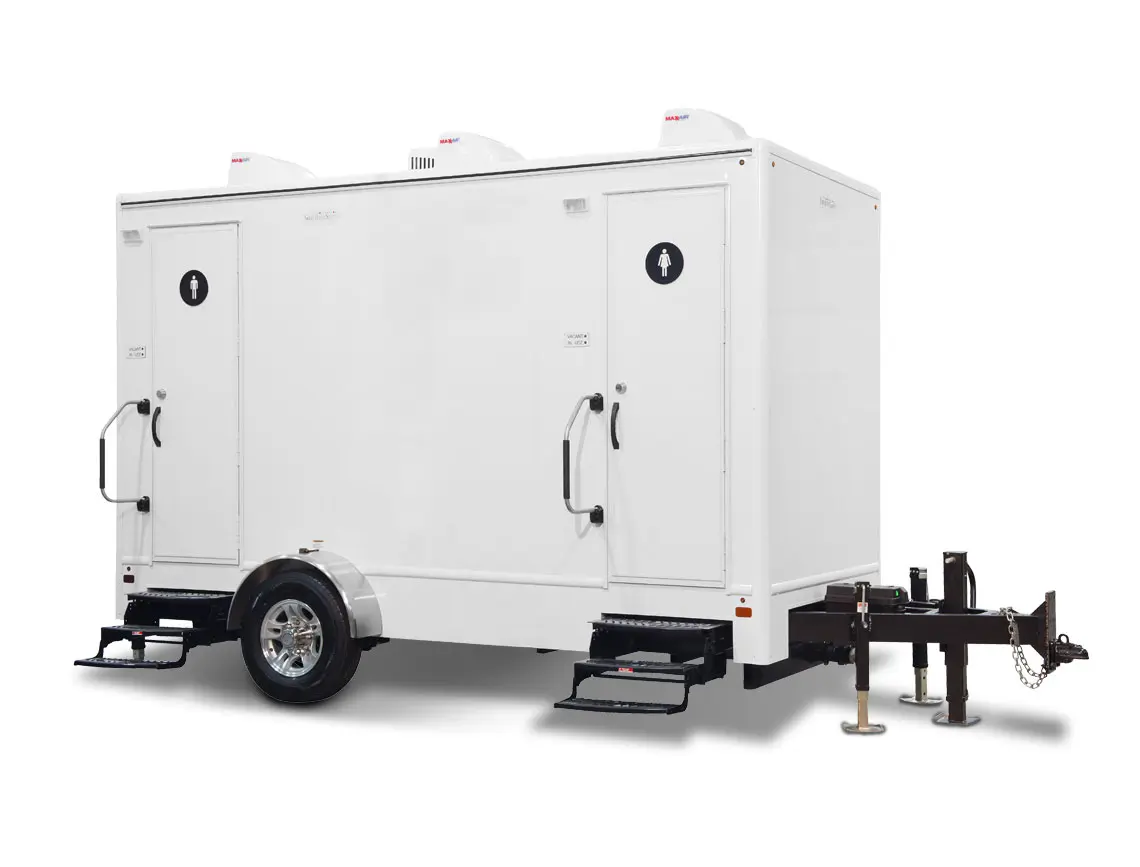
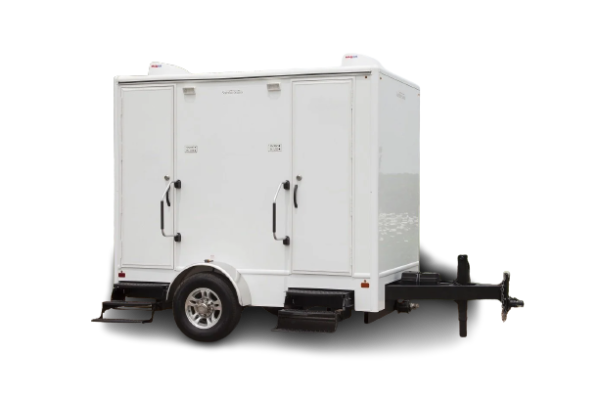
A compact, stylish solution featuring separate entrances for men and women.Each private suite includes flushing toilets, sinks with running water, interior lighting, and climate control for comfort at any event or worksite. (We offer variants 2–10 stalls.)
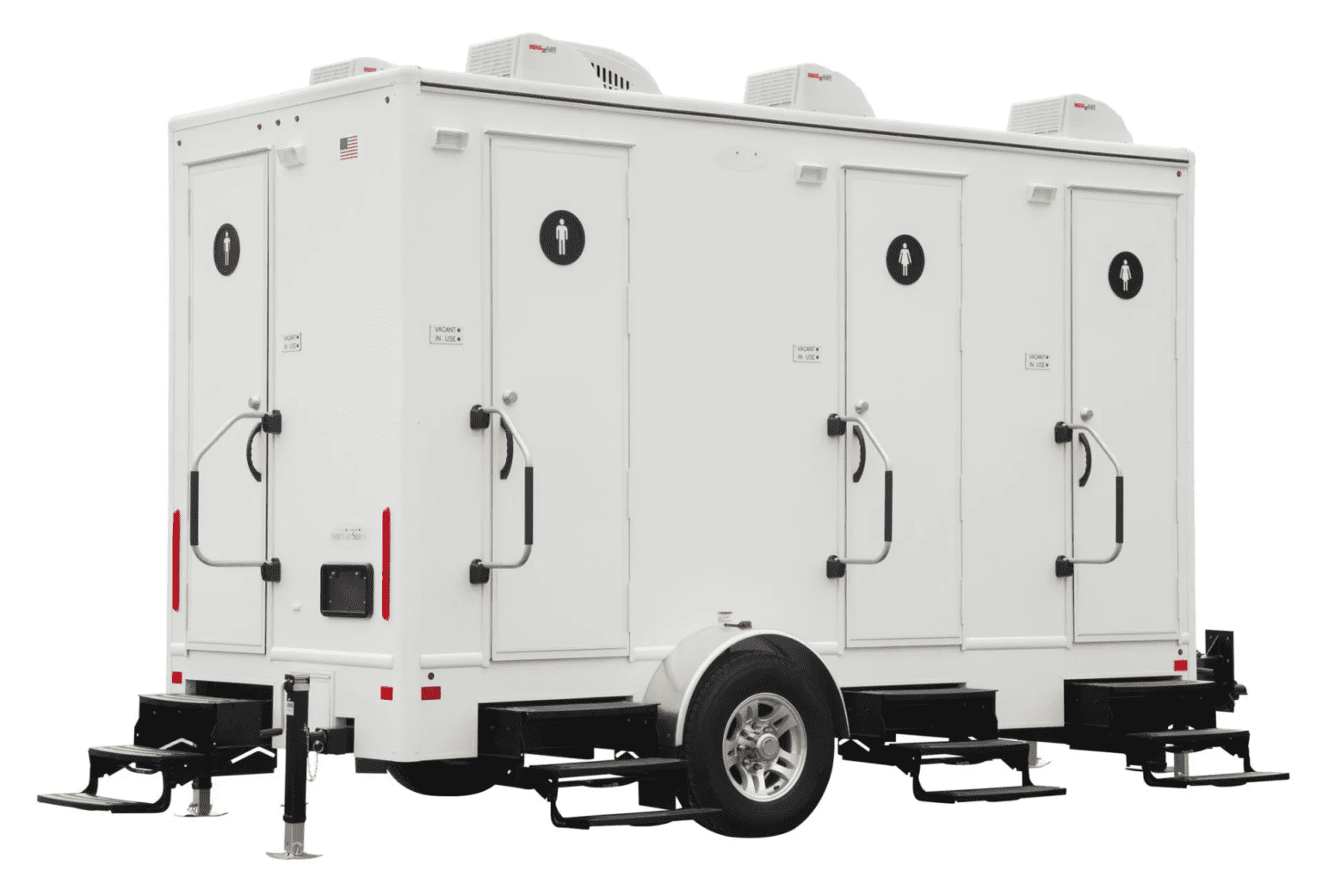
Designed for higher guest capacity, this unit offers four private, individual restrooms with flushing toilets, sinks with running water, interior lighting, and climate control. Ideal for weddings, festivals, and busy job sites.(We offer variants 2–10 stalls.)
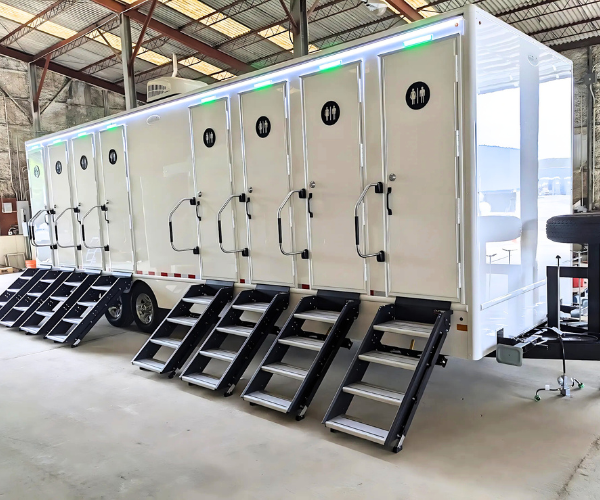
Perfect for large events and high-traffic sites, this spacious trailer provides eight private stalls, each with a flushing toilet, sink with running water, interior lighting, and climate control. A reliable, upscale solution for maximum convenience and comfort.(We offer variants 2–10 stalls.)
We Proudly Serve
Standard Portable Toilets
'R&R Enterprises' offers reliable standard portable toilets across Virginia, ensuring comfort and hygiene for any event.
High Rise Portable Toilets
In Virginia's Wyoming County, our high rise portable toilets provide sanitation solutions for elevated construction projects.
Restroom Trailers
Experience comfort and convenience with 'R&R Enterprises' restroom trailers in Wyoming County, offering premium restroom solutions.
Plumbing
Dependable plumbing services by 'R&R Enterprises' in Wyoming County guarantee optimal performance for residential and commercial needs.
Septic Tank Cleaning
'R&R Enterprises' provides thorough septic tank cleaning across Virginia, ensuring long-lasting system efficiency.
Grease Trap Cleaning
Expert grease trap cleaning services in Wyoming County by 'R&R Enterprises' help maintain kitchen efficiency and compliance.
Fencing & Barricades
'R&R Enterprises' offers durable fencing & barricades in Virginia, ensuring safety and security for any site or event.
Residential Storage
Secure and accessible residential storage solutions in Virginia, provided by 'R&R Enterprises', catering to Wyoming County locals.
Wyoming County Restroom Trailer and More
Obtaining a quote and scheduling delivery for a restroom trailer has never been more convenient. Our user-friendly platform allows you to easily request a quote through our online forms or by simply clicking the dedicated 'Get A Quote' buttons embedded throughout our website. The process is straightforward, requiring only your first name, last name, phone number, and email address. Once the form is submitted, our responsive team will promptly provide you with a competitive quote tailored to your specific needs. We pride ourselves on offering transparent pricing and flexible scheduling options to accommodate your busy agenda. With our streamlined approach, coordinating your restroom trailer delivery is efficient and stress-free, ensuring a smooth process from your first inquiry to the final service delivery. Choose our services to experience unparalleled convenience that prioritizes your satisfaction above all.
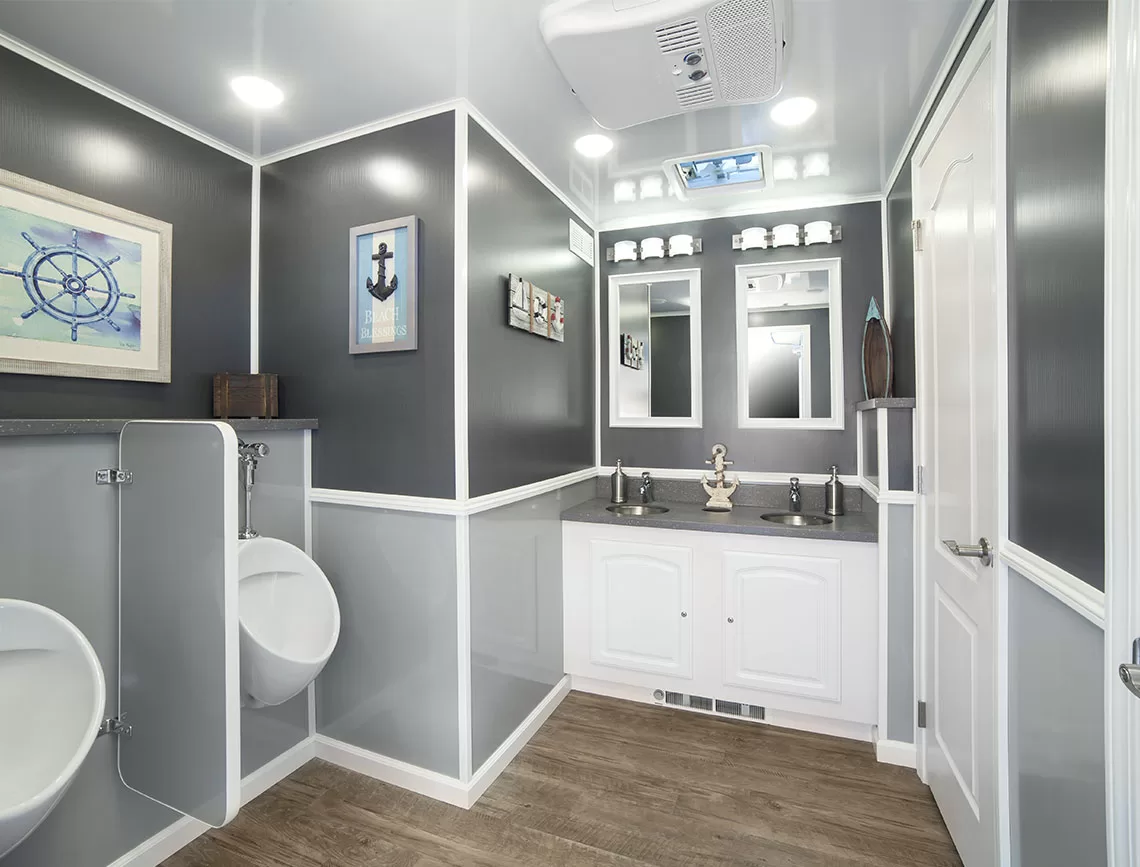
Nestled among the breathtaking beauty of Wyoming County, our restroom trailers offer perfect solutions for any event, enhancing the guest experience with clean and reliable amenities. Boasting local charm and a commitment to quality, we provide top-tier services for community events, outdoor attractions, and natural settings unique to the area. Whether at Pinnacle Rock State Park or coinciding with the lively festivities of the Wyoming County Fall Festival, our trailers are designed for ultimate convenience. With modern amenities that blend seamlessly with the vibrant spirit of Wyoming County, hosting a grand festival, an intimate family reunion, or a picturesque wedding becomes an elevated experience. Discover the local advantages of choosing our restroom trailer services, where proximity to nature meets sophisticated sanitation solutions tailored to your needs.
As the best choice in Wyoming County, our restroom trailer services set the benchmark for excellence in the industry. We are locally rooted, with a deep understanding of the community's needs, offering customized solutions that reflect our commitment to quality and client satisfaction. Our reputation for delivering impeccable services is built on a foundation of trust and excellence, ensuring every interaction is professional and personalized. Choose us for a seamless experience that showcases why our restroom trailers are the preferred choice in Wyoming County.
Our team excels in delivering prompt and dependable restroom trailer services tailored to your needs. Prioritizing speed and efficiency, we ensure your trailer arrives punctually, every time. Our experienced staff expertly manages every aspect from beginning to end, freeing you to concentrate on what truly matters. Rely on our unwavering commitment to swift and reliable service, guaranteeing you receive exceptional quality without delays.
Wyoming County: Discover Our Restroom Trailer
Renting a restroom trailer in Wyoming County is a simple, straightforward process designed with your convenience in mind. You can start by visiting our website, where you'll find 'Get A Quote' buttons prominently displayed on various pages. Clicking any of these links will direct you to a user-friendly form that requires only your basic details, including your first name, last name, phone number, and email address. This form is strategically placed at both the top and bottom of our pages, ensuring you have multiple opportunities to access it easily as you gather your information. By streamlining this initial step, we're able to quickly provide you with a tailored quote that meets your specific needs for both standard and luxury restroom trailers. Once you've completed the form and submitted your request, our team promptly reviews your information to generate a competitive quote. We then reach out to you, usually via the contact method you've provided, to finalize any details and answer any questions you might have about trailer specifications, customization options, or delivery logistics. As your event date approaches, we'll confirm the arrangement and coordinate delivery details to ensure your restroom trailers arrive precisely when you need them. Our fleet is maintained to the highest standards, guaranteeing clean, fully stocked facilities that enhance your event. By choosing us for your restroom trailer needs, you're guaranteed not only excellent customer service but also the expertise that comes with years of experience in the industry. From intimate gatherings to large-scale festivities, our team is committed to making your rental experience seamless and satisfying.
The delivery timeframe for restroom trailer orders is designed to accommodate the unique needs of each event we serve. Our team prides itself on efficient logistics and reliability, ensuring your trailer arrives on schedule, tailored to your specified timeframe. Typically, our clients can expect delivery within several days of finalizing their booking, though this is subject to availability and current demand. Once you have arranged your rental we'll work closely with you to establish a convenient delivery window that best suits your event plans. Our fleet is electronically tracked, allowing us to provide you with real-time updates on the status of your trailer during transit. On delivery day, our professional team ensures each unit is set up swiftly and securely, leaving you free to focus on other event preparations. The format includes same-day setup services for local clients and priority scheduling for urgent requests whenever possible. We understand the importance of having everything ready to go well before your event begins, which is why we remain committed to timely and stress-free delivery. Our rigorous maintenance schedule keeps our restroom trailers in optimal condition, prepared at a moment's notice to complete your event installations with precision and care. Whether you require a single unit or an entire fleet, our efficient and organized approach ensures all logistics are handled seamlessly. By choosing our services, you benefit from a delivery process grounded in attention to detail and consistent communication for a truly professional experience.
Yes, we offer versatile services capable of accommodating every type of event or construction requirement. Our extensive selection of restroom trailers is designed to suit diverse occasions, including festivals, sporting events, and community gatherings. We're also equipped to support weddings, corporate events, family reunions, and countless other special occasions. Our array of options includes luxury restroom trailers that elevate the ambiance of any formal gathering, along with standard porta potties for practical needs. Additional services like roll-off dumpsters, fencing and barricades, holding tanks, and ADA-compliant units expand our ability to cater to varied client specifications. Our portable sinks and hand sanitizer stations prove invaluable in maintaining health and hygiene standards, especially in large-crowd or multi-day events. By combining convenience with exceptional service delivery, we ensure client satisfaction at every level of engagement. Whether managing a bustling job site or an elegant soirée, our dedicated team provides seamless support, allowing you to focus on the success of your endeavor. Our goal is to deliver solutions that blend seamlessly into your event structure, enhancing the experience of all attendees with reliable, convenient facilities. With years of industry experience and a commitment to excellence, our services guarantee a hassle-free booking process and peace of mind throughout the event lifecycle.

